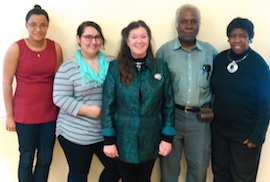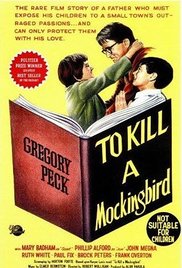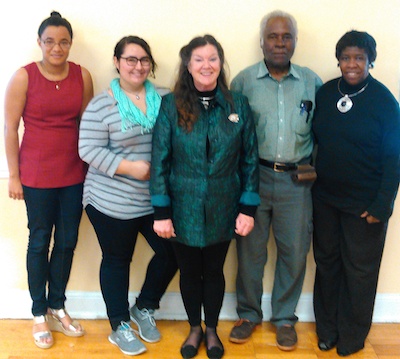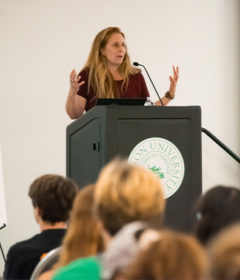Scouting for Justice

 In a quiet, rural, southern town, long ago but not so distant a memory, a little girl from Birmingham, Ala. – known then for being one of the most segregated and white supremacist cities with footage of demonstrations erupting in violence against blacks, a young girl, with no prior acting experience, was plucked for a role that would peg her for an Academy Award nomination. It was 1962, and only slowly was the end of segregation just eight years prior, infiltrating the country. Martin Luther King, Jr., hadn’t even had a dream yet, the civil rights movement was gaining momentum and a film called To Kill a Mockingbird was poised to make history.
In a quiet, rural, southern town, long ago but not so distant a memory, a little girl from Birmingham, Ala. – known then for being one of the most segregated and white supremacist cities with footage of demonstrations erupting in violence against blacks, a young girl, with no prior acting experience, was plucked for a role that would peg her for an Academy Award nomination. It was 1962, and only slowly was the end of segregation just eight years prior, infiltrating the country. Martin Luther King, Jr., hadn’t even had a dream yet, the civil rights movement was gaining momentum and a film called To Kill a Mockingbird was poised to make history.
Mary Badham, just 10 years old, played the young protagonist in the film based on the Pulitzer Prize-winning novel by Harper Lee as Jean Louise Finch, fondly nicknamed ‘Scout.’ And, the film shined a glaring spotlight on an ugly and controversial topic that, since retiring from acting at the ripe old age of 14 to pursue her education, Badham champions, touring and speaking at public school and university campuses – Social Justice. Recently in conjunction with Volusia County Public Library’s ‘The Big Read’ and the National Endowment for the Arts, Badham spoke at Stetson University to a full house.

“I came from a time and place where it was not only accepted but normal to have buses, water fountains, and restaurants starkly pasted with signs saying ‘whites only,’” recalls Badham. “Since those early days, I’ve had the great fortune of meeting many famous people, global ambassadors and traveling the world. But no matter where I roam, I still see blatant bigotry and real racism today. It hasn’t progressed; it’s just changed its clothes. I believe that while ignorance is the root of all evil, education is the key to freedom,” Badham said.
To Kill a Mockingbird (TKAM) is set in rural Alabama in the 1930s. Scout and her brother Jem intuitively support their father, Atticus Finch, a widower played in the movie by Gregory Peck. Atticus is an attorney representing a black man, Tom Robinson played by Brock Peters (who later also marked pop culture history as Fleet Admiral Cartwright in two Star Trek feature films). Robinson, the litmus test for the racism of Maycomb, Ala., is tried for allegedly raping and beating a white woman in the film. Although Atticus proves Robinson’s innocence beyond a shadow of a doubt, Robinson is found guilty by an all-white jury. Impatient for his promised retrial, Robinson, seeing no other way out, runs toward freedom and ultimately his demise. Scout learns many lessons throughout the film including how karma works on the real assailant. “There’s a lot of ugly things in this world, son,” Atticus Finch said to his son, Jem. “I wish I could keep ’em all away from you. That’s never possible.”
During a question and answer session, one participant asked Badham, “Did anyone have any idea what ya’ll were on the verge of doing with regard to this film?” Badham reflected, “There wasn’t a studio in Hollywood that would back a film like this. Then, Gregory Peck was sent the book. The very next day, Peck marched into Universal, having slapped down his own money for the film and said, ‘We’re makin’ this film and ya’ll can join us if you want.’” Another audience member asked, “How did you handle the obvious personal repercussions for your participation in this film from your family, community and also later in life?” Badham smiled and genuinely reminisced, “TKAM became my life, with lifelong friendships and second families with Hollywood royalty like the Peck family and the Peters family. Because I made this film in Los Angeles, a multicultural melting pot even then, and was surrounded by big city folk, racism wasn’t as prevalent in my world.
“Then, I returned to Alabama,” Badham paused. “One shocking day, Mama and Daddy reacted very badly when they saw me talking with John, our delivery boy: very smart, very well versed and very black. I so wanted to help John realize his dream of education. But being colored, in Alabama, in the early sixties, there was a slim to none chance of a person of color getting an education—even as smart as John was. And, Mama and Daddy were not on board with this at all even though Daddy was a champion at identifying white sheeted Ku Klux Klansmen (KKK); he would identify them by their horses. Hence the KKK began sheeting their horses too.
“TKAM changed my life by causing me to be acutely aware of the needs of our country, of people, and the world,” Badham continued. “It seems people are losing the ability to have empathy for other people these days. History repeats itself ya’ll and it’s critical to educate our children,” she said. “Show kids reality by passing down your families’ stories; read to your children. My favorite memory from TKAM is of Atticus reading on my bedside to me. But television is not reality.”
Ironically, Badham had another child acting role in the 1964 Twilight Zone episode, “The Bewitchin’ Pool” where children of arguing, divorcing parents escape through a magical passage in the bottom of a swimming pool into the guardianship of a kind, loving old woman, Aunt T, who mentors them.
“Children are our future and we must invest in them,” Badham said. “Education, our gift of time, stories like TKAM to teach history, and recounting the ramifications of social injustice, are powerful tools to do so.”
By Caroline Skinner



